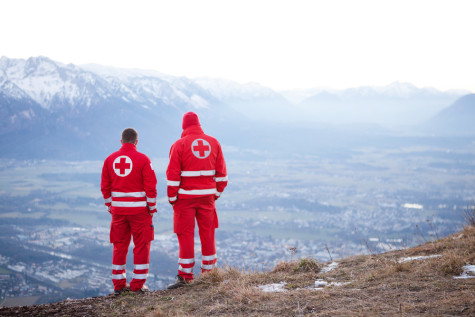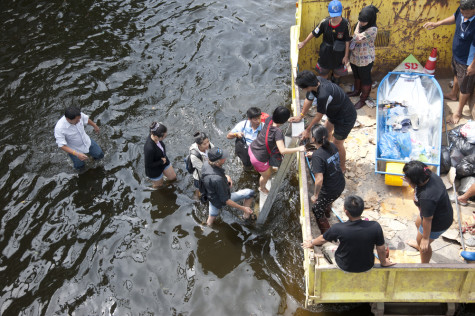 In April 2001, my cousin and I hitchhiked to Quebec City to register our dissent. Tens of thousands were gathered to protest the Free Trade Areas of the Americas Summit and we wanted to play our part for global social justice. Like many politically active young people before and since, I experienced what can happen when police are given the anonymity of a riot control uniform. I returned home reeking of tear gas and traumatized. It was exam time, but I was a wreck, jumpy and disillusioned. The world was suddenly a very, very scary place — and my experience was just a microcosm of those in the wake of atrocities and natural disasters.
In April 2001, my cousin and I hitchhiked to Quebec City to register our dissent. Tens of thousands were gathered to protest the Free Trade Areas of the Americas Summit and we wanted to play our part for global social justice. Like many politically active young people before and since, I experienced what can happen when police are given the anonymity of a riot control uniform. I returned home reeking of tear gas and traumatized. It was exam time, but I was a wreck, jumpy and disillusioned. The world was suddenly a very, very scary place — and my experience was just a microcosm of those in the wake of atrocities and natural disasters.
“In the hours after a disaster, at least 25% of the population may be stunned and dazed, apathetic and wandering…especially if the impact has been sudden and totally devastating.” – Beverley Raphael, from When Disaster Strikes
Despite the best efforts of peacemakers everywhere, violent conflict is in no hurry to leave us. Battles and attacks last mere hours – sometimes minutes – but their effects can stay with us for a lifetime. Ranked close behind in trauma are natural disasters that, thanks to climate change, are almost certain to continue their rise in frequency.
Doctors Without Borders can be on hand to provide medical assistance to refugees, and the Red Cross can handle the logistics of food aid, but the essence of horror is the person overwhelmed by forces far larger than their ability to cope. The broken mind must be tended to – not just later in years of counseling, but right then and there, using psychological first aid.
 The American Psychological Association has long held that disaster workers should understand how people tend to react to emotional stress and be familiar with how to cope with them, but it’s a practice that only found its footing in the 90s. Mental health services see a surge in demand after crises – usually an increase of 15-25% above the baseline, so after Hurricane Andrew, the Red Cross deployed mental health professionals to the scene for the first time to help.
The American Psychological Association has long held that disaster workers should understand how people tend to react to emotional stress and be familiar with how to cope with them, but it’s a practice that only found its footing in the 90s. Mental health services see a surge in demand after crises – usually an increase of 15-25% above the baseline, so after Hurricane Andrew, the Red Cross deployed mental health professionals to the scene for the first time to help.
Strangely, however, standard psychotherapy immediately after trauma may actually delay recovery. A study of those directly affected by 9/11 showed that the strategies therapists use to promote long-term growth and self-understanding are destabilizing in the short term. The skill set for acute distress mitigation is very different, and it doesn’t take nearly as long to acquire. Ideally for disaster preparedness, it would be held not by mental health professionals who get shipped in, but rather by a broad range of other workers who have regular contact with the public.
There’s no diagnosis or therapeutic intervention involved in psychological first aid. First it involves a triage, whereby incapacitating behavioural reactions are prioritized over those unlikely to impair long-term functioning. A reflective listener can help disaster victims clear their heads and become more task-focused – acknowledging their emotions while making sure they have a plan for the short term. Not only can these crisis interventions ease mental suffering – they also provide a sense of personal resilience, which will be useful for the further bumps in the road that are sure to come.
Yesterday Jane Hu wrote about disaster preparedness in the context of earthquakes. She found that one-time investments in canned foods tend to moulder, that people let their disaster insurance lapse after a period of calm, and that we’re generally bad at preparing. So what can you do that will set you up more sustainably for that dreaded day? You can get trained in first aid, both physical and psychological. You can be the secret asset to your city, ready for anything. Because there’s nothing so fortifying in a traumatic situation as having something useful to do.
“Because there’s nothing so fortifying in a traumatic situation as having something useful to do.”
Amen. Actually; Because there’s nothing so fortifying as having something useful to do.